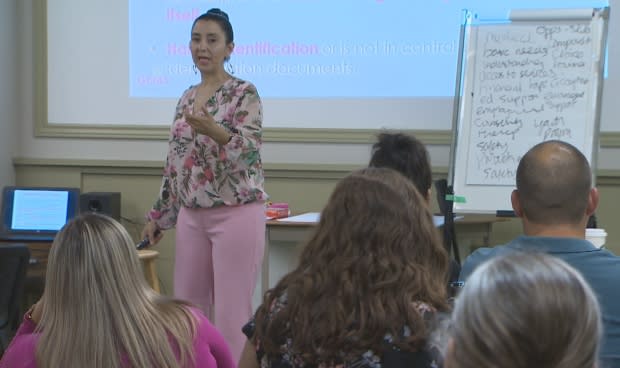Groups seek ways to make a difference in fight against sexual exploitation, trafficking
Courtney Brown is trying to shine some light on a dark subject.
Brown, the outreach social worker for the Association of Black Social Workers, was one of 50 people participating in a "train the trainer" seminar this week in Dartmouth that focused on ways to be more proactive in dealing with forced sexual exploitation of youth and sexual trafficking, and ways to provide support for people who are at risk.
Within her own community, Brown said the subject is a major issue.
"The reason it's one of the biggest issues is because it's not talked about," she said.
"It's an issue that's just undercover … and I think that's where the education piece needs to come in, especially to our youth to understand about healthy relationships and ways to be resilient."

The sessions involved representatives from a variety of government departments, social and community agencies and the RCMP and Halifax Regional Police.
Miia Suokonautio, executive director of YWCA Halifax, said the goal is to better equip these groups to respond to the issue by having in-house knowledge that can be shared throughout communities. Having so many groups represented makes sense because the issue is something they're all seeing, she said.
"We should, as a community, be equipped, skilled, competent, knowledgeable and prepared to respond," she said.
"All of the people who are attending here are seeing this exact same issue."
Statistics Canada released information last year showing Halifax and Ottawa had the highest rate of police-reported incidents of human trafficking between 2009 and 2016.
How to identify, engage and support
Rachel Lloyd, founder of Girls Educational and Mentoring Services and a survivor of the commercial sex industry, led the seminar.
Lloyd said she tries to teach people how to discuss the issue, how to change the way survivors are perceived and explain why some people might stay in the commercial sex industry.
"Sometimes we think that victims of trafficking are going to want to be rescued and so people come in with good intentions and then don't understand why a young person might be resistant to what they feel is help or assistance."
Lloyd said that means people need to learn about things such as the trauma bonds someone might feel toward the person exploiting them, including when they might be dependent on that person for shelter or food or even for a sense of being loved.
"We want to equip anyone who's likely to come in contact with an at-risk youth or a youth who's involved in the commercial sex industry to know how to identify, to know how to engage [and] to know how to support that young person."

It can be tempting to look for quick answers and solutions, but Lloyd said the reality is more complicated and nuanced.
Because the people most at risk are girls and women involved with the social or justice systems or from minority communities, addressing sexual exploitation and sexual trafficking also means addressing barriers to safe communities, such as a lack of affordable housing and child care, not enough living wage employment and inequities in educational opportunities, said Lloyd.
"That isn't as sensational or sexy a headline, but that's the truth about what would really make the difference."
A spokesperson for the Justice Department said the province has provided funding for supportive housing for survivors through a YWCA program, as well as grants for a variety of community-based prevention programs working to address the root causes of sexual exploitation and human trafficking.
Funding was also announced recently for two police officers to join an existing team of two with a mandate to investigate and pursue criminal charges in human trafficking cases.
MORE TOP STORIES

